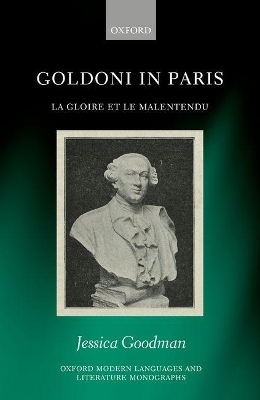Oxford Modern Languages and Literature Monographs
1 total work
The thirty years Carlo Goldoni spent in Paris hold an ambiguous place in his career. The preface to his autobiography explicitly draws attention to France as the site of his authorial glory, but elsewhere he dismisses his work for the Parisian Comedie-Italienne as a failure, and this view has come to dominate modern readings of his French experience. This study sets out to explore this apparent contradiction. By reading Goldoni's own contemporary and subsequent
accounts through the lens of his context as a dramatic author in 1760s Paris, Jessica Goodman sheds new light on both his experience and critical reactions to that experience. A key part of this contextualisation is an examination of contemporary Comedie-Italienne archives, resulting in the most
comprehensive existing account of this oft-neglected theatre and its authorial relations in the period. When material and artistic conditions at the Comedie-Italienne thwarted the self-fashioning strategies Goldoni had developed in Italy, he turned his attention to other areas of French life; notably the court and the Comedie-Francaise. Yet despite relative success in this regard, his career as an eclectic homme de lettres was lost in translation to posterity. In his
French Memoires, he constructed the claim of Parisian glory according to an out-dated understanding of what it meant to succeed in the French literary field, focusing predominantly on the power of Comedie-Francaise success. Ultimately, this construction was a failure: in modern France, Goldoni is remembered as a famous
foreigner, not the consecrated French litterateur he believed he had become.
accounts through the lens of his context as a dramatic author in 1760s Paris, Jessica Goodman sheds new light on both his experience and critical reactions to that experience. A key part of this contextualisation is an examination of contemporary Comedie-Italienne archives, resulting in the most
comprehensive existing account of this oft-neglected theatre and its authorial relations in the period. When material and artistic conditions at the Comedie-Italienne thwarted the self-fashioning strategies Goldoni had developed in Italy, he turned his attention to other areas of French life; notably the court and the Comedie-Francaise. Yet despite relative success in this regard, his career as an eclectic homme de lettres was lost in translation to posterity. In his
French Memoires, he constructed the claim of Parisian glory according to an out-dated understanding of what it meant to succeed in the French literary field, focusing predominantly on the power of Comedie-Francaise success. Ultimately, this construction was a failure: in modern France, Goldoni is remembered as a famous
foreigner, not the consecrated French litterateur he believed he had become.
